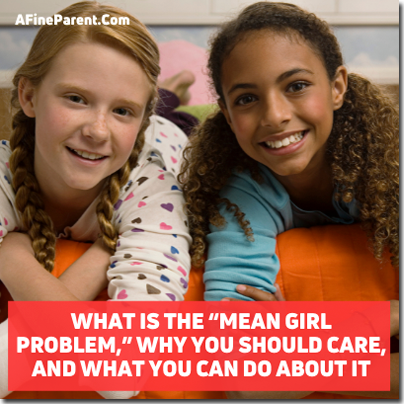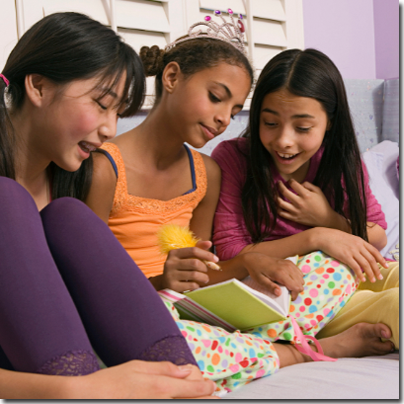 I still remember getting my first perm in middle school and smiling from ear to ear when the most popular girl in the school touched my hair and told me it “looked great.” That compliment felt like a rite of passage, at an age where acceptance was constantly sought out by most girls–even at the cost of meanness.
I still remember getting my first perm in middle school and smiling from ear to ear when the most popular girl in the school touched my hair and told me it “looked great.” That compliment felt like a rite of passage, at an age where acceptance was constantly sought out by most girls–even at the cost of meanness.
Once I started playing sports, I found a group of girls that were supportive and caring, many of whom I still keep in touch with today. But even while my team gave a sense of belonging, I still witnessed how very real the mean girl problem was. As I look at my young daughter, so devoted and loving to her friends and peers, I can’t help but cringe at the thought of her eventual experience with the mean girl problem.
The National Center for Education Statistics reported in 2019 that an average of 22 percent of students ages 12 to 18 reported being bullied, with girls reporting significantly higher (25.5%) than boys (19.1%).
Studies show that bullying can occur amongst any gender, race, socio-economic class, and even age (Do you know a bully in adulthood? Yeah, me too). We also know that there is importance in understanding the role that gender stereotypes play in bullying. Gender identity can impact how children adapt and interact with their peers; gender stereotypes can influence bullying as they impact the socialization of children into gender roles.
Yes, even in 2021, young boys are still socialized to be strong and independent, while females are socialized to be sensitive and understanding. Children who don’t act according to their expected gender roles are at higher risk of bullying by their peers.
Not only do girls report higher rates of bullying than boys, research also supports that girls are less likely to engage in physical aggression and more likely to engage in relational aggression or emotional bullying, including tactics such as:
- Backstabbing
- Cyberbullying
- Establishing unequal social rules for a group
- Excluding others
- Forming cliques (a group who will jointly and actively exclude outsiders and often focus on popularity status)
- Intimidation
- Using phone calls, texts, or written notes to harm others
- Making fun of others
- Spreading rumors
- Using peer pressure to convince others to engage in bullying
Most “mean girl behavior” does not come from a solo offender; most have followers or accomplices that are part of a developed “clique” that will rally around the leader in order to gain social standing within the group. Girls who are involved in these groups and join in on the bullying action likely know that what they are doing is wrong but will succumb to peer pressure regardless.
Perhaps even more interesting (and horrifying): Research shows that female bullying occurs not only by a group, but will also occur within the same clique, as the members are often in constant competition with each other. Leadership and power will shift as girls compete, resulting in a lack of trust–even within the same circle of friends!
That being said, all friend groups will experience turbulence from time to time just as our adult relationships do! Not all bumps in the road indicate that our children are experiencing a mean girl problem.
So how do we know if a peer challenge is temporary or if it’s part of the bigger issue of mean girl behavior?
The Warning Signs
 It’s hard to imagine my sweet second grader who loves her friends and defends them with a passion ever shifting in her mindset of girl support. It also seems impossible that little girls who care most about wearing clothes that they can run in and finding a friend they can simply have fun with may turn into young ladies who care most about their appearance, social status, and acceptance into a group!
It’s hard to imagine my sweet second grader who loves her friends and defends them with a passion ever shifting in her mindset of girl support. It also seems impossible that little girls who care most about wearing clothes that they can run in and finding a friend they can simply have fun with may turn into young ladies who care most about their appearance, social status, and acceptance into a group!
As our little girls grow up, the pressures put on them from society, peers, social media, and even adult expectations will shape and mold their priorities and responses to the world around them. In observing our daughters and their peers, some warning signs that there may be a mean girl problem include:
- Green with envy: Is your child showing signs of wanting to be on top, at whatever cost; maybe even hurting those they care about to get there? Envy is often at the root of mean behavior.
- “I do my hair toss, check my nails:” Does your daughter place high priority on how she looks: her makeup, clothes, shoes, hair, weight and acne? Girls who engage in mean behaviors not only hold this as a priority for themselves, but they may also hold a standard for those they accept into their group.
- It’s all about the rank: Do you notice your child is hyper focused on status? Girls who engage in mean behaviors may befriend peers based solely on the belief that they will enhance social standing.
- Stormy seas: Does your daughter often have issues with other girls? Girls who engage in mean behaviors may often be at odds with other girls, even those they call their friends.
- “Lemme show you how to do that:” Does your child express wanting control in social situations? Girls who engage in mean behaviors may often emerge as the one in charge of a group and may demonstrate controlling behaviors toward other girls in the group.
Habits of perfectionism are also important to recognize as contributors to the mean girl problem.
Let’s look at that last one in a little more detail. Katie Hurley, in her book “No More Mean Girls,” explains that perfectionism can occur in two ways: Self-Oriented Perfectionism (SOP) is when girls put pressure on themselves, while Social-Prescribed Perfectionism (SPP) is when girls perceive that other people are judging them and try to meet those expectations. Either of these can play a large role in females treating each other meanly.
 Worried about the perfectionist signs you recognize in your daughter? We partnered with Katie Hurley, child and adolescent psychotherapist and author, to explore perfectionism- what it is, where it comes from, and how it manifests itself in our daughters in the No More Mean Girls Masterclass.
Worried about the perfectionist signs you recognize in your daughter? We partnered with Katie Hurley, child and adolescent psychotherapist and author, to explore perfectionism- what it is, where it comes from, and how it manifests itself in our daughters in the No More Mean Girls Masterclass.
This packed masterclass is one of the 70+ masterclasses you get when you join the AFineParent Academy today. Click here to learn more.
The idea of someone else being more “perfect” may lead young ladies into toxic competition, which means that girls don’t want to be friends with someone they perceive as perfect. As adults, we know this way of thinking is all wrong. Our fully developed frontal cortex and complex brain synapses allow us to understand that:
- no human is unflawed and therefore a standard of “perfect” is unreachable.
- a glimpse into someone else’s life through a carefully posed picture is not an accurate portrayal of their real world. All people have burdens, secrets, and messy lives under the shiny surface.
Yet, even as adults we likely find ourselves experiencing envy and jealousy when another female appears to have the job, talent, car, house, body, or beautiful hair that we wished we had. Can you imagine how hard that must be to a young girl, who still has so much brain development to go?
So, what can we parents do to nip the mean girl problem in the bud and raise kind and supportive women? Here are 6 ways to do it:
#1: Encourage Team Activities
 A recent survey showed that 30% of girls felt they had less sports and leadership opportunities at school than boys. If this is the case, losing a spot on a team to another female could imaginably come with a slew of hard feelings: a loss of confidence, belief there will not be another chance, and even jealousy or vengeful feelings toward the female that “beat them out” for the spot.
A recent survey showed that 30% of girls felt they had less sports and leadership opportunities at school than boys. If this is the case, losing a spot on a team to another female could imaginably come with a slew of hard feelings: a loss of confidence, belief there will not be another chance, and even jealousy or vengeful feelings toward the female that “beat them out” for the spot.
Having been an athlete from middle school through college, I am a big advocate of the impact that team sports can have on individuals. The team mentality that is gained growing up as an athlete or being part of any organized team endorses collaboration that expands into adulthood. Organizations such as Girls on the Run provide girls from 3rd grade to 8th grade an experience focused on the connection between physical and emotional health, confidence, and supporting other females.
For girls who are not as interested in sports, there are many other opportunities for experiencing team activities, including:
- Academic clubs & committees such as Quill and Scroll or Adopt-a-Physicist
- Academic competitive teams such as Educators Rising
- Art clubs
- Cultural & language clubs
- Government clubs
- Leadership committees such as National Beta Club
- Media-based committees
- Music clubs
- Performance arts societies such as International Thespian Society
- Religious youth groups
- Social activism clubs such as the Gay-Straight Alliance
- Special interest clubs such as Girl Scouts
- Speech & political interest clubs such as Junior Statesmen of America
- Technology clubs such as social media clubs
#2: Read About Fierce Women
There is never too young of an age to begin reading to children; and as they get older and learn to read to themselves, books will impact their lives- which is why representation really does matter. Reading and giving our girls access to books about bold women who persist and persevere, even in the face of adversity, sets a stage for our young ladies.
Some women and books to consider starting with include:
- Little Leaders: Bold Women in Black History
- Malala’s Magic Pencil about Malala Yousafzai
- The Girl Who Thought in Pictures about Temple Grandin
- Margaret and the Moon about Margaret Hamilton
- Who Say’s Women Can’t Be Doctors? about Elizabeth Blackwell
- A is for Awesome!: 23 Iconic Women Who Changed the World
- Good Night Stories for Rebel Girls
#3: Normalize Giving and Seeking Help
 The current mental health crisis in children and adolescents is a huge concern. Studies that have focused on why mental health disorders in our children are so prevalent yet so undertreated suggest perceived social stigma and fear of embarrassment as a main reason. But why should this even be a thing?
The current mental health crisis in children and adolescents is a huge concern. Studies that have focused on why mental health disorders in our children are so prevalent yet so undertreated suggest perceived social stigma and fear of embarrassment as a main reason. But why should this even be a thing?
Much like emotional literacy is about validating emotions by acknowledging them to our children, we can also normalize giving and seeking help. We can normalize asking for help by:
- Modeling it: We can make sure that our girls see us ask for help when we need it.
- Talking about it: We can talk about times in which we leaned on our own girlfriends or asked for help, even if our child wasn’t there to witness it.
- Pointing it out: We can point out times in which females trusted other females enough to ask for help.
- Shouting it out: We can call positive attention to our child’s willingness to ask for help.
For those of us growing in the age of “Mr. Rogers’ Neighborhood,” we may remember the infamous moment in which Fred Rogers spoke about his mother calming his fears of the scary things he would see in the news by telling him to “Look for the helpers. You will always find people who are helping.”
The gravity of this quote was never meant to be applied to pandemics, yet in the era of COVID, it’s impact is real. How amazing it would be if we could encourage our young girls to be helpers–and how profound of a difference they will make!
Some ways in which we can encourage our young ladies to give help include:
- Volunteering: Allowing our girls to see us giving our own time and assistance is invaluable. Think about ways in which we can support other women, such as volunteering for a women’s shelter.
- Advocating: Standing up for women’s rights and for those with less privilege than ourselves will not be unseen by our daughters.
- Encouraging: Our girls will have ways in which they can provide support and help to other females from a young age. Observing our daughter give and receive help from other females should always be something we express our pride over.
#4: Have the Same Expectations for Girls and Boys
 Gosh, seems like such an easy concept, right? Yet, too often gender stereotypes seem to play into inequitable expectations between girls and boys. Although most parents do not explicitly endorse gendered messages, when they form expectations about a child’s interests, skills, and behaviors based on their gender, they are engaging in implicit parenting practices.
Gosh, seems like such an easy concept, right? Yet, too often gender stereotypes seem to play into inequitable expectations between girls and boys. Although most parents do not explicitly endorse gendered messages, when they form expectations about a child’s interests, skills, and behaviors based on their gender, they are engaging in implicit parenting practices.
Even when parents read stories to their children, they may engage in reading with implicit gender stereotypes. Research shows that both mothers and fathers tended to label sad children in stories as female and mad children in stories as male.
Just like with all implicit bias, awareness is the first step towards change. As parents, we can avoid implicit parenting practices by:
- Being aware of gendered marketing and making conscious choices to have different toys available for our children
- Using counter stereotyping, such as making statements of acknowledgement that boys play with dolls or dads are good at taking care of babies
- Disrupting gender stereotypes at home by being careful to assign all chores and tasks to both genders of children
- Using gender-neutral language as much as possible and avoid labeling items as male or female
- Encouraging mixed-gender play as research shows that children who have close friendships with opposite gender children have less sexist attitudes
#5: Debunk Perfection
 Teaching cognitive reframing to our daughters can help them reframe negative thoughts in a positive way–a great way to combat perfectionism that may contribute to toxic competition.
Teaching cognitive reframing to our daughters can help them reframe negative thoughts in a positive way–a great way to combat perfectionism that may contribute to toxic competition.
When girls are able to reframe negative thoughts and debunk perfectionism (the belief that they should be perfect OR the belief that another girl is perfect), they regain control of the situation and are more likely to create a positive outcome.
In her book, “No More Mean Girls,” Katie Hurley suggests playing the bounce back game to teach cognitive reframing. We can head outside with a basketball or playground ball and explain to our daughters that everyone has self-criticism. We can give an example of a negative thought that we’ve experienced recently and ask her to share one as well, while she bounces the ball to us. We can then bounce the ball back, sharing a positive counterpart thought to the self-criticism she shared; and then ask her to do the same to the negative thoughts that we shared.
Talking about negative thoughts and the positive counterparts also gives a secondary benefit of validation, as it acknowledges that it is normal to have self-criticism!
#6: Rearrange Body Image Ideals
 Reflect for a minute on your own body image perception. What do you like about your body and what do you wish you could change? Now, think about how often you have demonstrated with words or actions that you are disappointed that your body does not fit society’s “ideal” body image? I think we can all admit we’ve been guilty of this.
Reflect for a minute on your own body image perception. What do you like about your body and what do you wish you could change? Now, think about how often you have demonstrated with words or actions that you are disappointed that your body does not fit society’s “ideal” body image? I think we can all admit we’ve been guilty of this.
I’m sure you know where I’m going with this; the biggest impact that we can have in rearranging body image ideals is to model how we do the same towards ourselves and in the judgement we show our children towards other women. Our influence upon our daughters’ self-image is undeniable.
Creating a true beauty collage with our daughters can be a great way to endorse positive body image ideals. To make a true beauty collage, outline yourself and your daughter(s) on large pieces of paper. Use a giant roll of butcher block paper and make this life-sized if possible. Next, use cutouts from any magazines on hand as well as drawing materials and even photographs to “fill in” our beauty, adding whatever is meaningful to who we are.
The wonderful outcome of a true beauty collage is that the finished product is likely not going to have a focus on fashionable clothes or a thin waistline. Instead, it will be about strength, intelligence, family, friends, creativity, and play. Give it a try!
Oh, Regina George. If you’re like me and have watched Lindsay Lohan and Rachael McAdams duke it out on more than one occasion, then the movie “Mean Girls” likely came to mind at some point in reading this article. While on the surface it may seem like the entertainment industry capitalized on the discomfort of mean girl behaviors, the movie actually brought to light several social issues, including the idea that young girls are hyper aware of gender norms and cultural pressures.
“Mean girl” behavior may be a real thing, but there is also always a real girl behind the behavior. Encouraging our daughters to work together and build each other up is the best defense against mean girl behavior. We all have the ability, as parents, to empower our girls to be kind and compassionate leaders!
The 2-Minute Action Plan for Fine Parents
Take a few minutes to reflect on the following questions through conversation with a spouse or trusted friend, self-reflective thought, or journaling. Keep in mind that our daughters are never too young for us to begin this reflection:
- What has been my daughter’s experience with female peers up to this point in her life?
- What ways have I possibly held implicit gender bias in my parenting?
- Do I provide opportunities for my daughter to witness me asking or giving help to the other females in my life?
- Are my expectations for my daughter reflective of her being female? For parents who also have a son, this is a good place to do an expectation comparison.
- What opportunities does my daughter have or will she have (if not yet old enough) to experience a female “team” mentality?
- Do I see signs of perfectionism in my daughter and/or does my attitude/behaviors possibly reflect my own perfectionist thinking?
- What is my idea of beauty? What idea of beauty do I demonstrate to my daughter?
The Ongoing Action Plan for Fine Parents
After the above self-reflection, it’s time to make a commitment to the future! This may vary depending on your daughter’s age; but we can make a commitment to empower our girls to be kind and supportive women at any age! Find at least one of the below areas in which you can make a long-lasting commitment and then be sure to re-evaluate that commitment and other areas that you may be able to expand to on a regular basis:
- My daughter and I will research and decide on at least one activity that she can become involved in that will allow her to become part of a female team.
- I will find one book about a strong female leader to read with my daughter once a month.
- My daughter and I will research and find options for volunteering and spend time together supporting other females.
- I will consistently engage in counteracting gender bias by avoiding labeling colors, toys, or items as “girl” or “boy” (this is a great one for parents with very young children)!
- I will play the bounce-back game on a regular basis with my daughter as a check in to perfectionist thoughts.
- My daughter and I will make a true beauty collage, hang them in our home to refer back to, and make the commitment to remind each other of our beauty!
A great article which I read despite only having grandsons. I think the majority of it applies =equally to boys. The mean boy and bullying is out there and so important to be cool amongst your classmates.
Thanks, Wal. And yes, I agree- much of this can apply to boys as well!
This is right on point. There are mean girls on the job. This article gave me additional insight into their behavior. Shocked that adult women would behave this way. Had sisters, lots of female cousins, and attended all- girls h.s. Never saw how mean girls can be until I started to work.
Thanks for your comment, Tiffany. I agree- unfortunately there are still mean girls as adults… although there are also wonderful and supportive women! Thanks for reading.
Nice article with good insights. I’ve been trying to get my daughter to write everyday about one thing that made her happy today, one thing made her feel sad and lastly one thing that made her feel like “life’s like that!”
Hopefully as she grows bigger she will share some real experiences of her day and I can pick up on a few things early on.
Thanks Salil! I love this idea. And always appreciate your reads and comments!
It’s 2022 . I can’t believe this is still a problem in our world.
Agreed, Kaaren.
Enjoyed the article. I was bullied as a child. Remember coming home crying because the girls were so mean. Luckily I had a stay at home mom that was there for me when I did come home crying and she seemed to have a way to make things better. I now have a adopted daughter/granddaughter not wanting to go to school because the kids at school are mean. I don’t feel I have the same skills my mom had of giving what she needs to be resilient. I think kids are even meaner now! Of course the COVID pandemic hasn’t helped! All I can do is keep trying.
I’m so sorry you were bullied as a child. It sounds, however, like your daughter and granddaughter have exactly who they need to help them learn resilience. Keep up the hard work- you’re doing great!